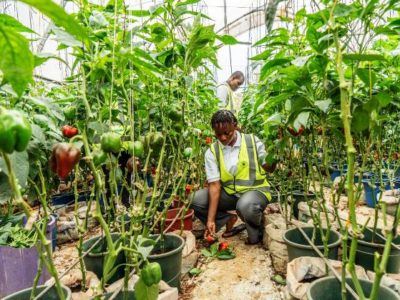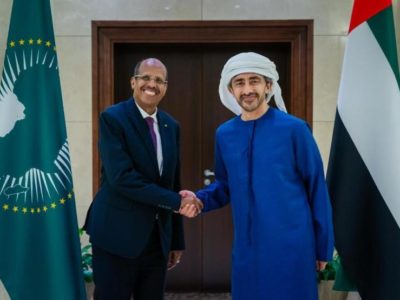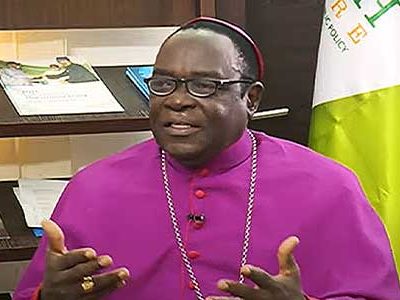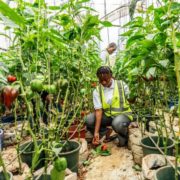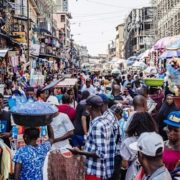“Misunderstanding Boko Haram is the major hindrance to tackling it” – Governor Shettima
“To the Boko Haram, the life of a muslim who doesn’t share the sect’s ideology is as condemned as that of a Christian or a traditionalist. This group of misdirected few amongst us has continued to unleash horror and of course, do so much harm to the integrity of religion of Islam.”
My very distinguished elders here, ladies and gentlemen, security is an obligation we owe each other; security is a shared business; we all have responsibility to champion it, if for no body else, at least for ourselves and the communities we reside. No crisis-ridden community in Nigeria is a distant cousin; every troubled community in Nigeria is indeed, a next door neighbor to the safe areas because like I have sometimes said, trouble is mobile. In the past, we only read issues of suicide attacks from happenings in the middle-east.
If some ten years ago, anybody had predicted that a day would come when a Nigerian man would tie bombs round his body and blow himself for the sole purpose of murdering and inflicting severe pains on a larger number of fellow Nigerians, such prediction would have been regarded less than what comedians like Basket Mouth say on the podium. Today, we have gone pass the stage of suicide attacks being exclusive to male members of the Boko Haram. A woman was on Sunday, reported to have bombed herself just to kill others. This is the extent of our problem. If Boko Haram succeeds in overrunning the Northeast as they seek, they will surely want to extend greater havoc to other parts of the north and if they overrun the north, they would want to extend to the south. Crisis of any type has got a life of its own which depends on something for survival. As humans we depend on oxygen.
“The Boko Haram insurgency has drenched our society in blood and systematically, it has been responsible for a creeping destruction of the harmony of communities in huge swathes of Borno state especially, but also in other states of Northern Nigeria.”
Crisis depends on negligence. And this negligence can be in different forms. Negligence can be in the form of parents or teachers failing to guide and instill the right habits in children to keep them out of crime from cradle; negligence can be in the form of Government at whatever level, failing to create and provide jobs to citizens in order to make crime unattractive; negligence can be in the form of Government failing to work hard to get the right intelligence at a good time or refusing to act appropriately with the right wares, where the intelligence is available. Negligence can take the form of citizens and societies failing to report or resist alien individual or group habits at early stages; negligence can be in the form of alien habits being taken for granted either by citizens, community leaders or Government; negligence can even take the form of elders, individual citizens and institutions failing to seat together discuss problems either at early or advanced stages to proffer solutions. By organizing this event, therefore, the Arewa Research and Development Project might have succeeded in crushing one big form of negligence.
I will like to thank the Arewa Research and Development Project (ARDP), for inviting me to present a keynote address at this opening ceremony that marks this very important Conference on Security and Human Rights in Northern Nigeria. I think a conference like this has come at a very critical lifetime of the Northern Nigeria. That our august body chose to bring those us the beginners to mix up with some of the most distinguished sons and daughters of Northern Nigeria, and other equally distinguished Nigerians, is a reflection of the seriousness of purpose that underscores the work of the ARDP. I am not surprised that this is so, anyway. The concept note, which accompanied the invitation I got for this conference, said of the ARDP, that “it is located in Arewa House, Centre for Historical Documentation and Research, Kaduna”. All of us from this part of Nigeria know what the haloed precincts of Arewa House represent in our history.
“We have seen the systematic spoliation of several other communities in other parts of Northern Nigeria, as a result of the spike in conflicts between nomadic groups and settled agricultural communities, as have been repeatedly reported by the media, in states like Benue, Kaduna, Taraba and Plateau.”
It was within what became Arewa House, that the late Sir Ahmadu Bello, Sardauna of Sokoto, provided the extraordinary leadership that transformed Northern Nigeria from the 1950s up to the tragic coup of January 1966. It was therefore no accident that subsequent leaders of our region chose to dedicate this building to research into every aspect of the life of Northern Nigeria and its people. Starting from the pioneering work done by the late Professor Abdullahi Smith, right up those at the helms today, the Arewa House has remained a special institution dedicated to very original, pioneering and enriching scholarship.
That ARDP is part of this tradition, becomes easier to appreciate; and the decision to organize a conference such as this, is further indication of the very unique relevance of this body. When I look around the hall, to behold the array of leaders and intellectuals gathered today, I can only conclude that all over Northern Nigeria, there is a realization and acceptance of the critical situation we face today, in terms of our security challenges and how they impact on the abilities of our people to enjoy the human rights enshrined in our Constitution; the African Charter on Human and Peoples Rights as well as the UN Declaration on Human Rights.
We are passing through some of the most difficult security challenges in Nigeria’s modern history. Not since the tragic events of the 1960s, which culminated in the Nigerian Civil War, has Nigeria been so challenged in its security architecture. I say this as the Governor of Borno state, which is at the epicenter of a most vicious, bloody and anarchic insurgency. The Boko Haram insurgency has drenched our society in blood and systematically, it has been responsible for a creeping destruction of the harmony of communities in huge swathes of Borno state especially, but also in other states of Northern Nigeria. The insurgency threatens the order of human and civilized existence and the ability of the state to provide the security and the welfare which Nigeria’s Constitution says is the basis for the existence of the state. This is on the one hand.
On the other hand, we have seen the systematic spoliation of several other communities in other parts of Northern Nigeria, as a result of the spike in conflicts between nomadic groups and settled agricultural communities, as have been repeatedly reported by the media, in states like Benue, Kaduna, Taraba and Plateau. In the past couple of years, new forms of banditry have emerged around Birnin Gwari, in Kaduna state, and in Zamfara state, whereby groups of bandits have entered communities to rustle cattle, kidnap women and lay to waste communities whose livelihoods are disrupted and have been pushed further and further to the desperate margins of social existence.
Several questions come to my mind all the time I reflect on our unfortunate situation in Northern Nigeria today. How did we arrive at this sorry pass? Why did we allow the security situation to deteriorate to the point where we now devote so much physical and intellectual energy as well as resources, to attempting to beat back the multi-pronged patterns of security challenges in our society? Were they no early warning mechanisms to have detected the portents coming to haunt our society? Did we as leaders play the ostrich or were we too busy tendering our individual comforts and so could not be bothered by the gradual approach of the monster of discord that metamorphosed into insurgency and general lawlessness? What really happened and what is the solution?
Distinguished ladies and gentlemen, we are gathered here to discuss security and human rights and this is apt.
However, if I must be honest and you should know this, for us in Borno State, our people are far from issues of human rights, our concerns are about human existence due to the frequency and ease with which the Boko Haram elements sniff out lives out of our citizens. Boko Haram slaughters; shoot and crush innocent people, destroy communities and public establishment for the fact that citizens do no share their violent ideology of murder and destructions. To the Boko Haram, the life of a muslim who doesn’t share the sect’s ideology is as condemned as that of a Christian or a traditionalist. This group of misdirected few amongst us has continued to unleash horror and of course, do so much harm to the integrity of religion of Islam. They have killed thousands of innocent souls in Borno and destroyed property worth tens of billions of naira.
I had blamed different forms of negligence as basis of our unfortunate ordeal. There is one form of negligence that I didn’t mention, but which to me, is one of the major factors, standing on our way to ending the Boko Haram. There is a supreme negligence of understanding the Boko Haram crisis its self and this makes it stubbornly difficult to make prescriptions.
Only days ago, my friend, the Minister of Information, the Chief spokesman of this country, Labaran Maku, trivialized the Boko Haram crisis by blaming it on Borno State Government. Maku, is the one to educate not just Nigerians but the entire world on what constitute Boko Haram. However, the driver happens to be blind. What would make someone really disturbed is that Maku was supervising minister of Defence for some time. No one might ever know the extent he might have inflicted his understanding of the Boko Haram, on security chiefs he had to work with. Maku spoke just days after the President, Commander In Chief, Dr Goodluck Ebele Jonathan said after the Paris summit, held recently, that the Boko Haram attacks began in 2002. He only corroborated what we know, what has been reported. In 2002, a group of men, then nicknamed Taliban, established a territory in border village called Kanamma in Yobe State which the sect code named Kandahar. The first attack of the sect was in that village in 2002. The group went underground, resurfaced in 2004 and attacking Bama and Gwoza in Borno; again went underground and resurfaced in 2007 in Panshekara in Kano for attacks on police; went underground and came out again in 2009 in Borno and some parts of Bauchi in what looked like a none violent movement at that time, under the late Mohammed Yusuf. In July, 2009, the sect launched serial attacks on police formations in Bauchi and Maiduguri towns. They went underground and returned in 2010 and here we are today. In between the periods they were going underground and resurfacing one can again see negligence somewhere along the line.
The Boko Haram crisis is highly misunderstood by many people, some of whom, unfortunately, are in position to form part of those that will make decisions to fight it. Let’s not forget that Maku is a member of the Federal Executive Council.
There is the unfortunate saying that Boko Haram is an agenda to stop a southern President from doing his job. Of all the attacks by the Boko Haram from 2002, their major attacks were in 2009 when Mohammed Yusuf was killed under a northern President, Umaru Musa Yar’adua. The attacks snowballed into 2011 till date. So, what are we talking about? I am deeply worried about the misunderstanding of the Boko Haram because the solution lies in all of us understanding it and facing it with sincerity. The problem is that those who do not understand the crisis can inflict others that might include those in position to directly deal with it. The misconception can trickle from the topmost level to the ground fighter and this is very dangerous. As it we have seen with the schoolgirls’ abduction in Chibok, the victim became the accused. This is the danger of deliberate misunderstanding or distortion. Then, they say the Borno State Government is not supportive in the fight against insurgency. Borno State has spent over ten billion naira and still spending, on co-funding the counter insurgency operations in Borno State. We have donated Armoured Patrol Vehicles to Police, donated about 400 hilux patrol vehicles to security agencies, we fuel and maintain these vehicles, we provide other material logistics for operations. We support families of police and military men killed in combat. Only last week, we gave police funds to give a million naira to every family of 16 policemen recently killed. We have done same to soldiers and we are still doing. We generate information from communities that we pass on to the military to analyze process and get their intelligence which they compare with other sources they should have. We fund the youth volunteers that are called the civilian JTF. We funded their training, kitted them, gave them patrol vehicles and we pay them stipends, yet some people say we are supporting
insurgency.
“The Minister of Information, the Chief spokesman of this country, Labaran Maku, trivialized the Boko Haram crisis by blaming it on Borno State Government. Maku, is the one to educate not just Nigerians but the entire world on what constitute Boko Haram. However, the driver happens to be blind. What would make someone really disturbed is that Maku was supervising minister of Defence for some time. No one might ever know the extent he might have inflicted his understanding of the Boko Haram, on security chiefs he had to work with.”
Frankly, the military, police and Department of State Service in Borno State have been trying given the circumstance. Many of them have laid their lives for Borno and Nigeria and we are in their indebt.
We need to address the security situation confronting us as a basis of our rights to life. What seems certain to me is that over the past couple of decades, we have built an increasingly UNCARING society, where the few rich have become extremely rich and continue to get richer. We have an economy that is much touted as growing rapidly, but is an economy that is not trickling down prosperity to the mass of our people.
As I have always said, beneath the mayhem of Boko Haram, underneath the nihilism of Boko Haram lies the underlying cause which is social exclusivity and extreme poverty. Once we engage the youths, once we create jobs, this nihilism, this madness will evaporate. At our current rate of population growth, we are expected to double our population every 22 years. By 2035, we are expected to hit the 400 million mark. We are projected to become more populous than the United States of America. What are our plans for these millions we are bringing forth? Oil is our main source of revenue. With the technology of hydraulic tracking and horizontal drilling, 15 African Nations are expected to become oil producing countries by 2016, the United States of America which was one of the major importers of our oil is no longer a major player in our oil export. It is projected to become the largest producer of oil soon because of the new technology of oil
sourcing.
The price of oil is hovering around 108 dollars at the moment, by the time more countries export, some experts project that the price of oil will fall whether we like it not even though we hope not, by the time oil price falls to between 35 or 40 dollars per barrel or the prices slashes by 50% from 108 dollars, how much will be available to take care of an increasing population? Like I have always said, most of us leaders are mostly concerned about this election and the next one; we do not care about what happens in between the two elections. The solution to Boko Haram for us in northern Nigeria is Agriculture. Land rather than oil is the most precious of all natural resources. The North has the most of Agricultural potentials. Nigeria spends nearly 20 billion dollars annually imported food stuff. We are the greatest food importing nation. The North can divert these funds when we produce what the rest of the country needs.
In Borno state, for the first time in 20 years, we funded the cultivation of 7,000 hectares of wheat in conjunction with the Chad Basin Development Authority which created 28,000 jobs through allocation of a hectare to a farm family of four. We have set up an Agricultural Transformation Team. At the moment we have imported over 400 containers of Agro equipment. We have imported 50 units of sprinkler and centre pivot irrigation equipment at a pilot stage which we are already installing at a new farm site. We have sent 50 unemployed graduates of Agriculture for three months train-the-trainers course on modern Agriculture at a University in Thailand, more trainees just completed their course in India. We are not neglecting other sectors of education, healthcare etc…
“Beneath the mayhem of Boko Haram, underneath the nihilism of Boko Haram lies the underlying cause which is social exclusivity and extreme poverty.”
Continue reading: We are doing those things as much as confronting the security challenges we face, assured that in Borno, we have over 1, 200 years of history. That long history was not a lineal story of smooth success. Our ancestors faced their own challenges and they overcame them. That is why we believe that even though the situation that we face with the Boko Haram insurgency is very challenging; we will also overcome. We are therefore sowing the seeds of the future with the choices we are making today. It is my hope that this Conference on Security and Human Rights will help us to examine all the issues at stake and proffer the types of solutions that can enrich the processes of policy formulation and execution all over Northern Nigeria. I am glad to note that you have brought together very competent individuals to examine the various issues that can assist in getting a rounded perspective on Security and Human Rights in Northern Nigeria. I wish you a very successful conference, and on behalf of the government and people of Borno state, I will like to thank you for inviting me to give a keynote address at this very crucial intervention.
Shettima, Governor of Borno State and former lecturer at University of Maiduguri, delivered this as keynote address at a two-day conference on security and human rights organised by the Centre for Historical Documentation and Research of Ahmadu Bello University which held Tuesday at the Arewa House in Kaduna.


